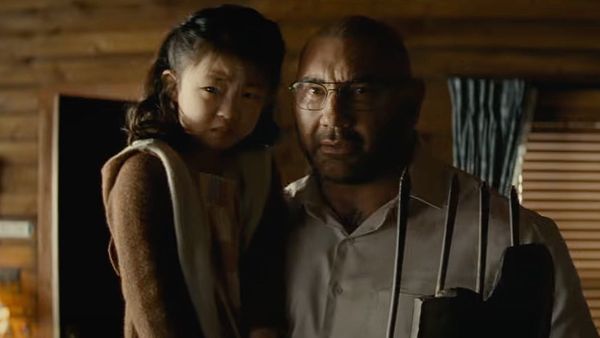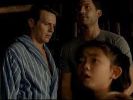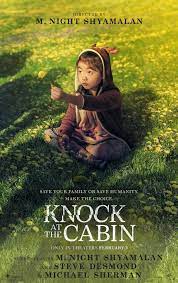Eye For Film >> Movies >> Knock At The Cabin (2023) Film Review
Knock At The Cabin
Reviewed by: Andrew Robertson

Few directors are as synonymous with the roots of apocalypse. Not only endings, but associated revelation. After Earth was post-apocalyptic, and to some extent The Last Airbender was after a disaster, while The Happening showed one, well, happening. He's also tied up in the domestic, and threats to convention. Lady In The Water, Old, The Visit, and variously Split. There are those that bridge both, The Village is based in existential threats to a way of life, Signs too.
Knock At The Cabin is differently based on a home invasion. More specifically, upon Paul Tremblay's 2018 novel The Cabin At The End Of The World. The film follows the book quite closely until its third section, Bloody Like The Day You Were Born. Thereafter the two part ways massively, though their trajectories have been closely parallel until then. Whole sections of dialogue are shared, and though it seems improbable Dave Bautista is one of the few actors available who matches the description of the mild-mannered but mountainous Leonard. He is 29 and a half years older, admittedly, but casting adaptations is never easy.

The eponymous structure is a holiday cabin, lakeside. Daddy Andrew (Ben Aldridge), Daddy Eric (Jonathan Groff), and adopted daughter Wen (Kristen Cui in a feature début). Aldridge has a large amount of TV work to his credit, including as Thomas Wayne in Batman-adjacent TV show Pennyworth. Groff has portrayed a handful of villains, Smith in The Matrix Resurrections, King George in Hamilton, and Kristoff in Frozen. Their chemistry as a family convinces, though we always see it through the lens of their visitors.
A quartet. Button-down shirts. Differently coloured, red, white, black and pale. That, as well as many other things, is not a coincidence. Their names are from the novel, as are the grasshoppers in the jar. Nikki Amuka-Bird as Sabrina, Bautista, looming large in the film and its publicity, Rupert Grint's Redmond, and Abby Quinn as Adriane. The opening credits feature nightmarish drawings upon a sheaf of ephemera, and those papers are recontextualised as we discover more about the four.
There is much from the source novel, though some details are changed. Adverts are reconstructed to allow Shyamalan a cameo in an infomercial. The media properties referenced in the novel are changed. That third section shares its title with a song by sludge metal outfit Whores, the distinction between that and the film's use of a track by KC & The Sunshine Band is not a small one. They both feature TV cartoons, but different ones. Though there are shots of Haystack Rock at Cannon Beach in Oregon, the film doesn't mention at all, nevermind as frequently as the novel, that it appears in The Goonies.
Elsewhere the cabin's geography is different. Flashbacks change some details the novel gives us in other ways, and what in the book is a moment of desperate improvisation is in the film a product of planning, greater agency on the part of our characters. In a film that's about choices it makes some very different ones.
M Night Shyamalan is impeccable as a creator of tension. Its resolution, perhaps infamously, a more difficult question, but he has few peers for dread and unease. In context it's easy to be minded of Hanneke's Funny Games, either of the versions a decade apart. The subversion of holiday idyll has various outposts, from Hostel to Alice, Darling. The mention of other films is in part because the source is definitely aware of them, the conventions and expectations not just of genre but of rolling news channels, mobile phones, online message boards and hate crimes.
He co-writes here with Steve Desmond and Michael Sherman. They are a writing duo, who had a few short films to their credit before appearing on 2019's 'Black List'. That started as a insider's survey of the 'most popular' scripts circulating in Hollywood, and now serves as a development back-channel. One of nine films (so far) of the 66 made, those others include Don't Worry Darling, The Menu, The Unbearable Weight Of Massive Talent. Many of the ideas there aren't entirely original, that year's list featured two different treatments called 'Apex', and They Cloned Tyrone is literally about duplication.
Knock At The Cabin has plenty of repetition, and that's part of it where it succeeds. As the visitors enact their ritual each successive iteration brings new detail, new distress. Where it struggles is that it is part of a pattern itself. Anyone who has seen the trailer has a sense of what is going to happen. Even from the opening, grasshoppers trapped in a jar, there is an atmosphere of containment, of constraint. Shyamalan manages to set out the boundaries of this, but even with airholes punched in the lid it doesn't quite have room to breathe. There is an expectation that there will be an ending, and there is - one markedly different than the source text. Harder to determine though is if the summons to attention is worth answering. It's a repeated complaint about Shyamalan's films, which makes it easy to knock. While it's familiar enough to ring a bell, it struggles to straddle a line of uncertainty. It seems to try to keep the door open to multiple interpretations, but it can't quite lock it down.
Reviewed on: 10 Feb 2023
















